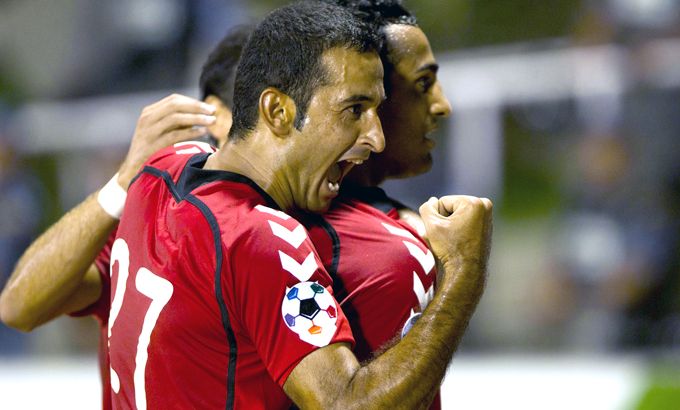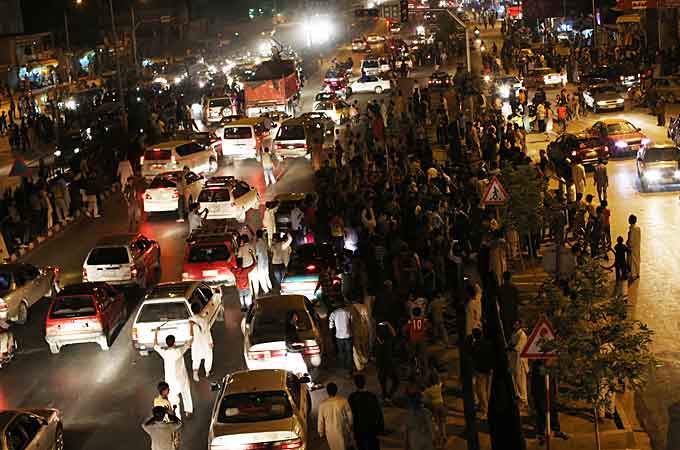Afghanistan triumph over India
Celebrations erupt in Kabul as footballers clinch SAFF Championship title and first international trophy in Kathmandu.

Afghanistan have won their first international trophy in football, beating India 2-0 in the South Asian Football Federation Championship.
Mustafa Azadzoi put Afghanistan ahead early in the first half on Wednesday at Dashrath Stadium in Kathmandu, Nepal, and Sanjar Ahmadi doubled the lead in the second.
Keep reading
list of 4 itemsArsenal score 3-2 derby win over Spurs to extend Premier League lead
Man City close gap on Arsenal to one point with emphatic win at Brighton
Moroccan club ‘wins’ cup tie 3-0 after Algerian hosts confiscate kits
When it was over, the Afghan players walked around the field with the national flags draped on their shoulders.
They then held hands and started to dance in a circle in celebration.
The football team’s success has been a point of unity in a country riven by ethnic divisions, with Afghans of all backgrounds praying for victory.
The win over India avenged the team’s loss in the SAFF Championship final two years ago. India beat the Afghans 4-0 in the 2011 championship match.
Within minutes of the victory on Wednesday, the streets of Kabul were filled with young men in cars, on motorcycles and on foot celebrating the nation’s first international trophy, Al Jazeera’s Ali Latifi reported from the Afghan capital.
From the Wazir Akbar Khan neighbourhood to Shahr-e Naw, the commercial centre, the screams of “Zindabad Afghanistan!” were accompanied by the sounds of Piroozi, a song performed by seven Afghan pop singers for the Afghan Premier League, playing from the car speakers and mobile phones of the cheering crowds.
Sounds of gunfire
In the Kartei Parwan neighbourhood, where the sounds of gunfire – including Kalashnikov ack-ack – pierced residents’ windows, Akbar, originally from the eastern province of Maidan Wardak, said he cried tears of joy at the win.
“I’ve seen every match, but this was the only one that moved me to tears,” he said.
Aziza, a middle-aged resident of the Kartei Parwan neighbourhood, said she too found herself crying tears of joy.
 |
| Celebrations following the football triumph disrupted the flow of early-evening traffic in Kabul [Sulyman Qardash/Al Jazeera] |
“Imagine, a small country with so many problems beating an economic powerhouse like India,” she said.
While Afghan flags waved and young men screamed out “Two! Two! Two!”, referring to the number of goals scored by the Afghan team, some questioned the style of celebration, Al Jazeera’s Latifi said.
One taxi driver who found his vehicle stuck at a major roundabout in Shahr-e Naw was frustrated by the disruption to the flow of early evening traffic.
“So we won. It’s done. All this over a football game?” he said.
Unlike the commemorations of Ahmad Shah Massoud – the anti-Soviet resistance icon assassinated on September 9, 2001, two days before the 9/11 al-Qaeda attacks in the US – the driver saw little sense in the overzealous actions of the football fans.
“Massoud was a national hero. Whatever they do for him will never be enough, but why turn the city upside down over a football match?”
For Simin, in her late 80s, the sounds of gunfire booming from her Kartei Parwan neighbourhood recalled the years she spent living in the basement of her house for protection from the rocket and gunfire of the civil war of the 1990s.
“I’m glad we won. Very happy, but all this ruckus will only scare the children.”
Recent re-emergence
The Afghans, who were a founding member of the Asian Football Confederation in 1954, have a long football history but only recently re-emerged on the world scene after decades of war and insurgency.
Afghanistan have never played at the World Cup, or even at the Asian Cup. But the country has been getting better in recent years, rising up the FIFA rankings to No 139 on the latest list.
Afghans began playing football about 90 years ago, and the country’s national federation was founded in 1922. Afghanistan joined FIFA in 1948.
Throughout the 1950s, 1960s and 1970s, football gained a strong following in the country, but it nearly died out during the 10-year Soviet occupation from 1979 to 1989 and the civil war that followed from 1992 to 1996.
When the Taliban ruled from 1996-2001, they severely restricted sports and football stadiums were used to stage executions of those who ran afoul of the group’s harsh laws.
After the Taliban regime was toppled in 2001, sports in Afghanistan was reborn, with both cricket and football on the rise in international competitions.
– Ali Latifi in Kabul contributed to the story